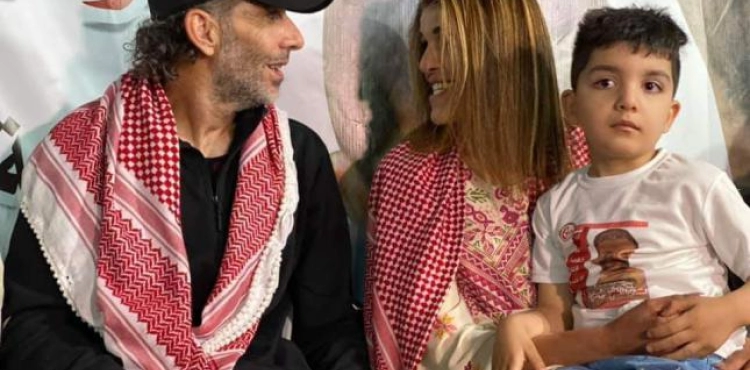The freed captive Salah Hussein (49 years) and Sherine Nazzal (41 years old), held their wedding ceremony in the town of Beit Duqqu, northwest of Jerusalem for the first time in the presence of their child, who gave birth to him via a sperm smuggled out of prisons Occupation.
He has been detained since 2004 and sentenced to 15 years´ imprisonment.
The wedding ceremony was held 24 hours after his release from the occupation prisons in the town´s park, in an atmosphere of joy, in the presence of dozens of guests.
On the impact of drums, hums, patriotic songs, and dabkeh songs, Salah, who wore a "black suit and red tie", marched over a horse and around him family and friends.
As for the bride, Sherine wore after long waiting for her long white dress, which she dreamed of.
Salah held his marriage to Sherine during his family years in "Beersheba" prison years ago, without ceremonial ceremonies.
Salah and Shireen gave their child Ali (5 years) in an artificial insemination process by smuggling semen from inside the prison.
Sherine says: The love story with Salah started 18 years ago, but his pursuit of the Israeli army and his arrest in 2004 prevented them from fulfilling their joy in holding the wedding.
Sherine and Al-Saada added on her night night that the arrest of Salah spoiled their marriage plans, while the Israeli authorities prevented his visit, as they were not officially linked, which frustrated her at the time.
She stated that preventing the Israeli authorities from visiting Salah prompted her to demarcate the relationship between them, and as a result, she obtained an official agency from him through the International Committee of the Red Cross to hold a marriage contract and after 4 years of detention she was able to visit him as his wife.
Sherine described the first meeting between them as "difficult because he was behind the glass and crossed the prison phone for a few minutes with a break in the sound."
Regarding the birth of her only child, Ali, Sherine explains: "We decided to become pregnant through smuggled sperm, just like other prisoners who succeeded in making this step."
She points out that the idea was encouraged and accepted by family and friends until it was implemented, and in fact the sperm arrived and was successfully cultivated, and her child Ali was born in 2015, who was unable to see or embrace his father and get to know him only through pictures.
The prisoners of high judgment over the past years exchanged the idea of ​​"smuggled sperm" for their wives by smuggling their semen from inside the prisons, but the issue has been discussed in a framework of hesitation and suspicion.
Several attempts by the prisoners to smuggle their semen out of prisons for various reasons did not succeed, but their thinking about and implementation of it reflects their silent and unspoken suffering and their desire for a dream that can only be achieved by releasing them.
The method of remote pollination of prisoners´ wives depends on a complex process that begins smuggling semen during the visit of a member of the prisoner´s family, with the requirements for this regarding the mechanisms of transportation and the techniques necessary for him.
The bridegroom, who belongs to the Popular Front, expresses his happiness at his wedding, his release from the occupation prisons and the recent embrace of his child.
Salah added, while his friends and relatives turned around him, that his son Ali is the fruit that culminated in 15 years of detention in prisons, expressing his hope for freedom of all prisoners in Israeli prisons.
And occupy about five thousand prisoners in the occupation prisons, including dozens who spent more than 20 years in detention.












